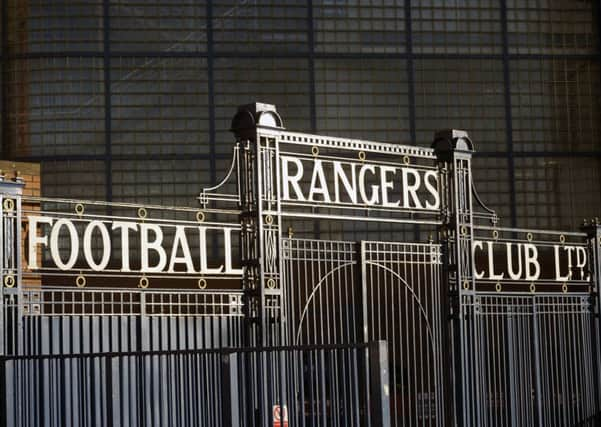SPFL to '˜consider' implications after Rangers lose '˜big tax case' ruling


Lord Hodge announced in court that five Supreme Court judges had unanimously dismissed an appeal by the liquidators of oldco Rangers.
HMRC had lost two earlier tribunal hearings over the EBT scheme before a ruling in their favour in the Court of Session in Edinburgh in 2015.
Advertisement
Hide AdAdvertisement
Hide AdAbout £50m was paid to dozens of Rangers players and staff through the scheme, administered by the Murray Group, then majority shareholder of the Glasgow club, from 2001 to 20010. The club contended these should be classified as loans but HMRC insisted they were taxable earnings.
The result will mean the creditors of the oldco, RFC2012, will receive less money from the pot collected by liquidators BDO, as HMRC will now be owed even more money. Rangers, then run by Craig Whyte, went into administration in February 2012 over a separate tax debt and the tax authority rejected a creditors agreement in June of that year.
The result is a major victory for HMRC in its attempts to recoup tax from thousands of other companies which ran EBTs and similar schemes, which were the subject of a crackdown in legislation enacted in December 2010.
In a written judgment, the judges said: “The sums paid to the trustee of the Principal Trust for a footballer constituted the footballer’s earnings. The risk that the trustee might not set up a sub-trust or give a loan of the sub-trust funds to the footballer does not alter the nature of the payments made to the trustee of the Principal Trust .
“The discretionary bonuses made available to RFC’s employees through the same trust mechanisms also fall within the tax charge as these were given in respect of the employee’s work.
“Payment to the Principal Trust should have been subject to deduction of income tax under the PAYE Regulations.”
Former Rangers chairman Sir David Murray said he was “hugely disappointed” with the verdict, which “runs counter” to the legal advice provided to the club.
He added: “It should be emphasised that there have been no allegations made by HMRC or any of the courts that the club was involved in tax evasion, which is a criminal offence.”
Advertisement
Hide AdAdvertisement
Hide AdThe Supreme Court’s decision has led to renewed calls for further action to be taken against the club, including demands for Rangers to be stripped of the 13 honours it won during the seasons when the EBT scheme was in operation.
As it stands, the verdict will not have a direct impact on the club as it exists now. The assets, business and Scottish Football Association membership were transferred to a new company in 2012 to allow the team to continue playing as Rangers.
Rangers had to pay a £250,000 fine issued by the then Scottish Premier League (SPL) in 2013 after the oldco club were found to have withheld “side letters” detailing EBT payments to players in breach of league rules, but an SPL independent commission, led by judge Lord Nimmo Smith, ruled Rangers had gained “no sporting advantage.”
It noted: “Rangers FC did not gain any unfair competitive advantage from the contraventions of the SPL rules in failing to make proper disclosure of the side-letter arrangements, nor did the non-disclosure have the effect that any of the registered players were ineligible to play.”
“For this and other reasons,” it added, “no sporting sanction or penalty should be imposed upon Rangers FC.”
At the time the commission announced its findings in February 2013, however, the EBT scheme was regarded as acceptable by a First Tier Tax Tribunal, which is responsible for handling appeals against HMRC: just four months previously, the oldco club had won its tribunal case in principle, a decision which was appealed by HMRC.
Although that appeal was thrown out by an Upper Tier Tribunal in July 2014, HMRC appealed again, this time to the Court of Session; in November 2015, three judges found in HMRC’s favour.
The Scottish Professional Football League (SPFL) - which assumed control of the Scottish top flight game following a merger in June 2013 between the SPL and the Scottish Football League - said will now study the binding Supreme Court judgement before making any further comment.
Advertisement
Hide AdAdvertisement
Hide AdA spokesman said: “The board of the SPFL notes today’s judgement of the Supreme Court. We will now take time to examine the judgement in detail and to consider any implications for the SPFL.”
However, longstanding critics of Rangers said the Supreme Court decision should lead to action.
Former Liverpool and England striker Stan Collymore called on authorities to strip the club of the titles it won over the period in question.
Writing on Twitter, he said: “Rangers should have every title expunged from the records. Disgraceful financial cheating on an industrial scale.”
He also said that the difference between the “abuse” of EBT schemes by Rangers and English clubs was “zero,” adding: “Rangers just thought they were big enough to say ‘F you’ to HMRC.”
Today’s judgement, however, is likely to have far reaching consequences throughout the British game.
A number of clubs in England also operated EBT schemes, and while some have already settled with HMRC, otherc could not be hit with demands.
HMRC has “encouraged” companies which used similar schemes to settle tax bills in light of the ruling. A settlement opportunity in light of the 2010 legislation ran out in July 2015 and other firms could now be liable for major sums.
Advertisement
Hide AdAdvertisement
Hide AdIn a statement, HMRC said: “The unanimous decision of the Supreme Court supports our view that Employment Benefit Trust avoidance schemes simply do not work.
“This decision has wide-ranging implications for other avoidance cases and we encourage anyone who’s tried to avoid tax on their earnings to now agree with us the tax owed.
“HMRC will always challenge contrived arrangements that try to deliver tax advantages never intended by parliament.”